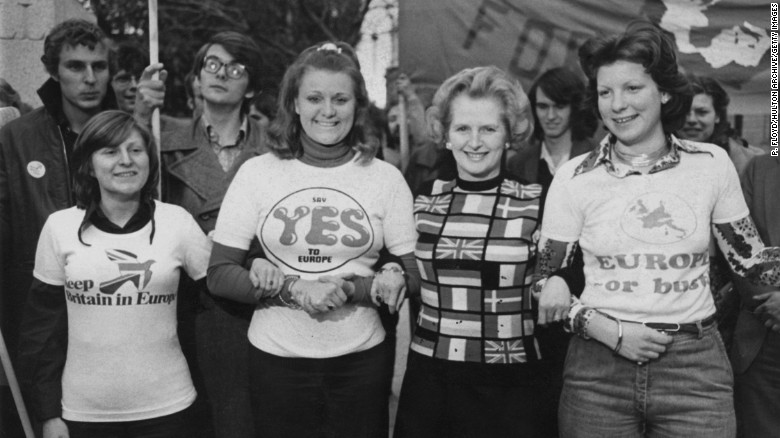London – As marriages go, 43 years is not bad. But ever since Britain and Europe tied the knot in 1973, the relationship has been a tortured one — with arguments about money, accusations of infidelity and seeping exasperation on both sides.
It was a Conservative Prime Minister, Edward Heath, who championed the cause of Europe and negotiated Britain’s accession to what was then the European Economic Community in 1971. Then too, opinion in Britain was divided, with the center of British politics arguing “join” while left and right resisted. But the lengthy courtship had none of the sulfuric resentment of the divorce that would follow four decades later.
Young love
I am old enough to remember the October night in 1971 when the House of Commons voted in favor of joining. It seemed important. Many people, my parents included, accepted the argument — but without much enthusiasm.
The United Kingdom was still adjusting to its post-imperial place in the world, clinging to the comfort blanket of the “Special Relationship” with the United States to disguise its diminished status. It was often derided as the “sick man” of Europe, beset by strikes. Europe was the “modern” alternative, an escape route from irrelevance.
The British flag was raised over the European Community’s headquarters on January 1,1973. But the honeymoon didn’t last. Within two years, a Labour government was demanding a renegotiation of the “pre-nup.”
Heath’s successor, the wily Harold Wilson, insisted his government had won “big and significant improvements on the previous terms.” And he called a referendum to approve the deal, allowing his Cabinet members to argue for or against as they wished. Sound familiar?
On that occasion, the British people voted by a large margin to sustain the marriage. A renewal of vows, if you like.

Cracks start to show
Enter Margaret Thatcher, and the birth of the term “Eurosceptic.” The daughter of a grocer from Grantham in eastern England — a place that voted heavily Thursday in favor of Brexit — she had an innate suspicion of all things European. And plenty of “Eurosceptic” Conservative MPs shared that suspicion.
Uniting Europe, she once said, was “a classic utopian project, a monument to the vanity of intellectuals, a program whose inevitable destiny is failure: only the scale of the final damage done is in doubt.”
Once again the marriage was on the rocks. Once again, Britain wanted better terms as the price of its membership. Thatcher seethed against plans for the ever-closer union — including a single currency and greater powers for the EU Commission and Parliament. “No, no, no,” she famously told the House of Commons in 1990.
Worse still, in Thatcher’s eyes, the architect of greater integration was a French socialist, Jacques Delors.
Tabloid newspaper “The Sun” chimed in with one of its most famous headlines: “Up Yours Delors.”
Divide deepens
Thatcher embodied and shaped much more than hostility to an “ever closer European union.” She was nationalistic, hostile to immigration, devoted to shrinking government.
As she campaigned to become Prime Minister in 1979, Thatcher stirred controversy on immigration by saying that, “People are really rather afraid that this country might be rather swamped by people with a different culture.” She held out the prospect of an end to immigration, though never delivered on it.
Deeply patriotic, she once said that “national pride offers people a genuine identity in a world of cardboard cut-outs.”
Her sentiments came roaring back into focus at the last European and British elections, when the UK Independence Party claimed Thatcher’s philosophical legacy. UKIP leader Nigel Farage claimed that “on Europe — yes — we are the true inheritors of Thatcher.”
UKIP won 3.8 million votes at the 2015 election, riding a wave of popular resentment about immigration from within and beyond Europe. Those were 3.8 million reasons for the “establishment” to take notice of a growing insurgency and worry about the outcome of the referendum.
As Marcus Roberts at the polling group YouGov puts it, a sequence of elections in the UK had shown that “the gap between the metropolitan, cosmopolitan, middle-class voters and working-class social conservatives has now grown so great that it simply cannot be ignored.”
And not just working-class social conservatives.
Britain calls in the lawyers
Across England, the people of the “shires,” as the rural counties are known, voted heavily for “Leave.” Many were long-standing opponents of the European project, fed up with the interfering “Eurocrat” elite, drinking in the articles of one Boris Johnson when he was the Daily Telegraph’s reporter in Brussels, mocking intrusive EU regulations about jam jars and fruit-size (even if those regulations were often and wilfully mis-reported.)
Others were reluctant Europeans, but antagonized by the stumblings of the European Union in dealing with the migration crisis and worried by the impact of free movement across the EU on already stretched welfare services.
My 85-year old father was among them.
So exactly 41 years after voting in favor of the UK to remain part of Europe, he entered a polling station in rural Suffolk and voted Leave.
As reported by CNN
